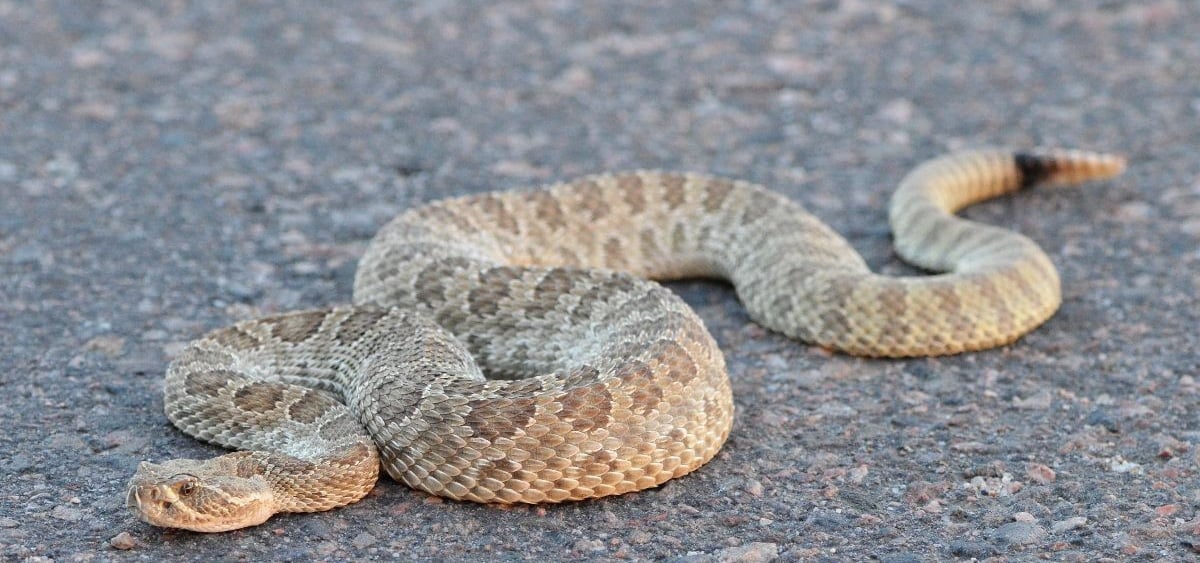Did you know rattlesnakes are commonly found in many of Douglas County’s Open Spaces and hiking areas? There’s no cause for concern if you understand how you, your family and your pets can coexist with rattlesnakes in common spaces.
Information and tips about living among rattlesnakes courtesy of Colorado Parks and Wildlife
Why are people bitten and what is the result?
Rattlesnakes have an elaborate defensive strategy, seeking to avoid the need for a venomous bite if possible. Most of the time, rattlesnakes will not strike at people unless they feel threatened or are deliberately provoked.
While attacks on people are rare and usually not fatal for a healthy adult, bites are very painful and should always be taken seriously. Bites can have an increased effect on children and pets due to their smaller size.
Ecology and Behavior
A basic understanding of the biology and behavior of rattlesnakes can help you avoid unwanted encounters. Rattlesnakes often warm themselves in the sun, hunt, migrate and den in the same areas year after year.
- Rattlesnakes are not built for speed, waiting in the same locations for hours, or days for a prey animal to walk by. Because of their slow speed, rattlesnakes will usually stand their ground when threatened.
- Rattlesnakes use camouflage to blend in with their surroundings and in most cases will ignore people, thinking you cannot see them.
- If a snake coils up, or makes a rattle noise, you are too close and should move away slowly. Stepping back just a few feet can convince the snake you are not a threat.
- Rattlesnakes shelter in winter dens during the coldest months and resume activity in April or May, migrating several kilometers in search of food.
- Snakes are often seen during the spring and fall when cool temperatures require them to bask in the sun on warm surfaces such as pavement or rocks near trails or roads.
- Hunting usually occurs in the late afternoon and evening once the snakes have warmed up their bodies. When temperatures allow, rattlesnakes may also prowl for food in the early afternoon or at night.
Awareness and Avoidance
The best way to avoid dangerous encounters with any wildlife is awareness and avoidance. Always be aware of your surroundings using your eyes and ears and avoid wildlife that you see or hear.
- Watch for snakes basking in open, sunny areas such as pavements, rocks, trails or roads. It is acceptable to walk off trail to avoid them.
- Watch where you place your hands and feet at all times, watching for areas such as rocks or logs that could be sheltering a rattlesnake.
- Do not hike with headphones or earbuds in so you can listen for a rattlesnake’s distinctive rattle.
- Protect your feet and ankles as they are usually closest to rattlesnakes. Sturdy leather boots afford good protection; do not hike in sandals or flip-flops.
- Use extra caution around dusk when visibility drops. Use a light and be sure to wear boots, even in camp.
- Travel in groups. More people mean more opportunities to see or hear a snake and more people to call emergency services in the event of a bite.
What to do if a snake is encountered
If an encounter with a snake is unavoidable, take these precautions to stay safe:
- Freeze in place. Snakes are often heard before they are seen. If you hear a rattlesnake, FREEZE in place until you or a companion can locate the animal. Attempting to move away from a snake you can’t see may lead you closer to it! Even if the snake is in plain view, freezing movement will reduce the threat you pose to the snake and help you calmly assess the situation.
- Establish space between you and the snake as they can strike from a long distance. A good rule of thumb is to put at least five feet between yourself and the snake. If possible, move slowly back the way you came.
- Leave the snake alone. NEVER, under any circumstances, should you try to catch, kill, provoke or move a rattlesnake. One-third of people who suffer snake bites were bitten as a result of trying to handle or kill the snake. Move around the rattlesnake at a safe distance out of its way.
- If you find a snake in your home or garage, call your local wildlife office for directions. In urban areas, many pest control companies can remove them for you.
Keeping your pets safe
The best way to keep your pets safe from rattlesnakes is to keep them on a six-foot leash as required on most public lands in Colorado. Dogs are known to be very curious animals that ignore a snake’s defensive posturing.
If you live in an area where rattlesnakes are common and must let your pets outside, try to eliminate rock piles or grassy areas that could harbor snakes or common prey. Do a quick patrol of the area before letting your pets roam free.
Many dog training facilities in Colorado offer snake avoidance training for dogs, teaching them to avoid the sight, scent and sound of a snake.
A rattlesnake bite can have an increased effect on pets due to their small size. In the event of a bite, seek immediate veterinary attention and call the clinic ahead of time. Do not attempt to kill or catch the snake for identification.
What to do if a human is bitten by a rattlesnake
According to the Colorado Poison Center, if bitten by a rattlesnake you should:
- Call the Poison Center at 1-800-222-1222 for instructions, then go to the nearest hospital.
- Remove any jewelry and tight-fitting clothing.
- Stay calm and avoid excess movement.
- Do not cut and try to extract venom.
- Do not use ice, heat, or tourniquet.
- Do not try to capture or kill the snake.

